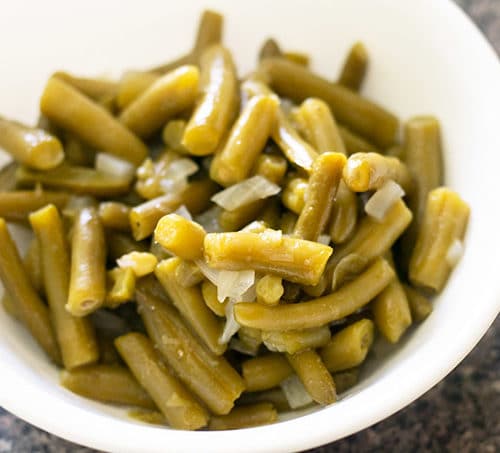
It’s as familiar a sight as any in the American kitchen, both at home and at schools and other public meeting places: a can of green beans, or other “conventional” canned vegetables.
Canned vegetables and fruits are convenient, we all know that. What most people don’t realize is that these fruits and veggies may come in cans laced with BPA, also known as bisphenol A, a chemical used to make plastics and resins since the 1950s that has been linked to cancer.
These “conventional” food products also are usually packed with pesticides.
The more you eat them, the more your body is exposed to potentially harmful substances. Now, one consumer organization is sounding the alarm as part of the latest iteration of a yearly list that has become a guiding light for millions of people.
Blueberries, Green Beans Added to Newest ‘Dirty Dozen’ List for Pesticides
Two foods known to be healthy have become corrupted by our toxic food and farming system, according to the Environmental Working Group’s (EWG) latest press release. The EWG said that this year’s Dirty Dozen of most pesticide-soaked foods is based on federal agencies’ tests. The list is based on data from 46,569 samples of 46 fruits and vegetables, covering 251 different pesticides.
Some of the pesticides detected have been banned in the U.S. or Europe because of concerns as to how they harm people.
The Environmental Working Group released the results, this March, thirty years after a landmark study from the National Academies of Science warning of the dangers posed to children by pesticides.
This year, blueberries and green beans were new entrants to the ‘Dirty Dozen’ list, coming in at #11 and #12, respectively.
“(Blueberries and green beans) had troubling concentrations of organophosphate insecticides, pesticides that can harm the nervous system,” the EWG wrote on its website. “Some (showed) traces of up to 17 different pesticides.”
Blueberry Pesticide Concerns
This year’s results drive home the importance of buying blueberries, with their soft outer layer that readily absorbs pesticides, organic whenever possible.
“Nearly 80 percent of blueberry samples had two or more pesticides,” the EWG wrote.
“Phosmet was detected on more than 10 percent of blueberry samples and malathion on 9 percent.
“Both are organophosphates that are toxic to the human nervous system, especially children’s developing brains.
“In 2015 malathion was classified as ‘probably carcinogenic to humans’ by the International Agency for Research on Cancer.”
***
Try Organic Superfood Bars with Organic Blueberry, Pumpkin Seeds, Spirulina, Ginger and More!
On Sale Now – Click Here to Get Yours Today Only
***
Green Beans
If you’ve ever felt there’s something a bit “off” about the taste and quality of canned, “conventional” green beans, you’re not alone.
These beans became a part of the Dirty Dozen due to their contamination with dozens of pesticides.
“More than 70 percent of green beans had at least two pesticides, with a combined 84 different pesticides found on the entire crop,” the EWG wrote.
“Six percent of samples showed residues of acephate, a toxic pesticide the Environmental Protection Agency banned for use on green beans more than 10 years ago.
“Green beans also had traces of several pesticides banned in the European Union but allowed in the U.S.,” EWG added in its report, which can be read in full here.
Thanks for reading! The best way to keep pesticides out of our food supply and our children’s bodies is to support the organic food industry. Click on this link to take advantage of the Earth Day Sale from Paleo Valley, makers of Organic Bone Broth, Organic Whey Protein, Organic Superfood Bars and much more!
Thanks for installing the Bottom of every post plugin by Corey Salzano. Contact me if you need custom WordPress plugins or website design.






